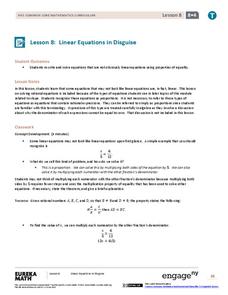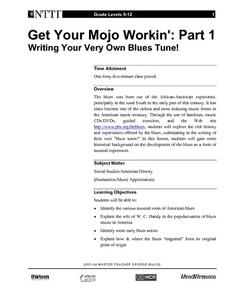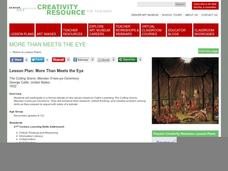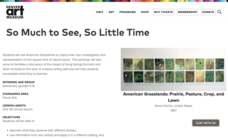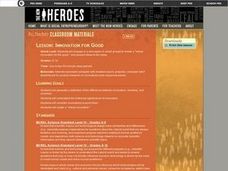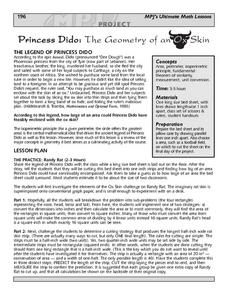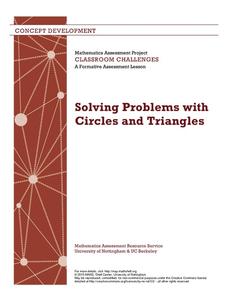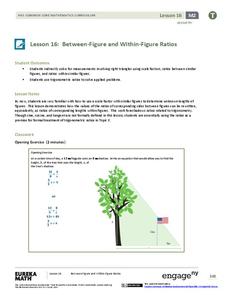EngageNY
Putting the Law of Cosines and the Law of Sines to Use
Use the Law of Cosines and the Law of Sines to solve problems using the sums of vectors. Pupils work on several different types of real-world problems that can be modeled using triangles with three known measurements. In the process,...
EngageNY
Introduction to Simultaneous Equations
Create an understanding of solving problems that require more than one equation. The lesson introduces the concept of systems of linear equations by using a familiar situation of constant rate problems. Pupils compare the graphs of...
EngageNY
Linear Equations in Disguise
In the eighth segment of a 33-part unit, learners look at equations that do not appear to be linear at first glance. The equations are proportions where the numerators and denominators may have more than one term. To round out the...
EngageNY
Bacteria and Exponential Growth
It's scary how fast bacteria can grow — exponentially. Class members solve exponential equations, including those modeling bacteria and population growth. Lesson emphasizes numerical approaches rather than graphical or algebraic.
EngageNY
Deriving the Quadratic Formula
Where did that formula come from? Lead pupils on a journey through completing the square to discover the creation of the quadratic formula. Individuals use the quadratic formula to solve quadratic equations and compare the method to...
EngageNY
Using Trigonometry to Determine Area
What do you do when you don't think you have enough information? You look for another way to do the problem! Pupils combine what they know about finding the area of a triangle and trigonometry to determine triangle area when they don't...
Curated OER
Get Your Mojo Workin': Part 1 Writing Your Very Own Blues Tune!
Upper graders listen to the blues. They discuss blues scale, read a description of the blues, and work together to write an original piece. A lesson like this ties into American history and African-American musical contributions very...
Curated OER
Creating an Original Opera
This may be a lot to ask of a high schooler, but then again, who knows? Pupils work in groups to explore, write, and then perform an original opera. They view versions of The Magic Flute and La Traviata, then compose a plot, characters,...
Concordia University Chicago
The Pietá by Michelangelo Buonarroti
Why is arts education so important? It builds critical thinking, analysis and creative problem-solving skills. Learners review the life of Michelangelo Buonarroti, and then analyze his piece, The Pieta. After that, they'll sculpt a human...
Curated OER
Lesson: More Than Meets the Eye
Older learners analyze a controversial painting entitled The Cutting Scene, Mandan O-kee-pa Ceremony 1832. They use the issues raised in the image to construct debate arguments questioning if the artist's painting exploits Native...
eGFI
Marshmallow Design Challenge
How tall is your marshmallow structure? With limited supplies (including uncooked spaghetti noodles, masking tape, and one marshmallow), teams endeavor to support the marshmallow atop the tallest spaghetti structure they can build....
EngageNY
Solving Percent Problems II
Fill in the blanks to find the best discount! Groups complete a table of amounts and percents associated with sale items. Classmates then find the original cost, sale cost, discount amount, paid percent, or the discount percent based...
Illustrative Mathematics
Friends Meeting on Bikes
It is the job of your mathematicians to figure out how fast Anya is riding her bike when meeting her friend. The problem shares the distance, time spent riding, and Taylor's speed leaving the last variable for your learners to solve. Use...
EngageNY
Solutions of a Linear Equation
Use the distributive property to solve equations. The sixth lesson in a 33-part series has scholars solve equations that need to be transformed into simpler equations first. Class members apply the distributive property to the equations...
Denver Art Museum
So Much to See, So Little Time
How do humans and animals impact the environment? What is land division? Youngsters tape off a 12x12 inch square in an outdoor natural space. They sketch everything they see, then compare their drawings as a class. They will then be...
Curated OER
Innovation for Good
Many historical innovations were created for the common good. Get your students ready for life as a critical thinker with this lesson which defines the differences between innovation and invention. They will conduct Internet research,...
EngageNY
Solve for Unknown Angles—Angles and Lines at a Point
How do you solve for an unknown angle? In this sixth installment of a 36-part series, young mathematicians use concepts learned in middle school geometry to set up and solve linear equations to find angle measures.
Discovery Education
Clutter Cutter
Challenge young learners to cut the clutter with this fun engineering project. As employees of a home and office supply company, young engineers are asked to develop devices that organize everyday items. After participating in a...
Curated OER
The Geometry Of An Ox Skin
High schoolers investigate the concepts of area and perimeter. The activity uses a legend to create a context for the proposed word problem. They use the skill of estimation in order to create an ox skin that is found in the story.
Illustrative Mathematics
Security Camera
A different-than-normal problem that allows learners to practice their reasoning to find an answer. The problem bases itself off a graph drawing of a store that needs to install security cameras. The challenge is to find which placement...
Curated OER
The Engineering Design Process
Students utilize their creative skills by solving engineering issues. In this problem solving instructional activity, students examine the 6 steps to the engineering process by completing a worksheet. Students examine one of three...
Code.org
Creativity in Algorithms
Groups work with the program they built in the previous lesson to make it more creative. The resource challenges pupils to add functionality to their existing programs by adding a new command.
Mathematics Assessment Project
Solving Problems with Circles and Triangles
After completing a task involving examining the ratio of areas of triangles and circles in a given figure, scholars examine sample responses to identify other strategies they could use to solve the problem.
EngageNY
Between-Figure and Within-Figure Ratios
Tie the unit together and see concepts click in your young mathematicians' minds. Scholars apply the properties of similar triangles to find heights of objects. They concentrate on the proportions built with known measures and solve to...




